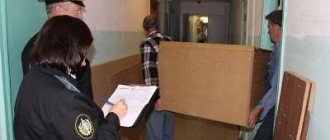Police, Ministry of Emergency Situations, collectors, firefighters, military commissars, workers of public utilities and management companies: who must be allowed into the apartment and who should not? We understand the exceptions to the general rule on the inviolability of home and private property.
Police, Ministry of Emergency Situations, Housing Office, emergency services, collectors, National Guard, bailiffs - who has the unconditional right to enter the home. The right of citizens to the inviolability of their home is guaranteed by the Constitution of the Russian Federation, albeit with some reservations. The inviolability of an individual’s home may be limited by law in exceptional situations when public interests require it. This can be done by the court or those government bodies that are given such a right by law. There is a whole circle of people whom everyone is obliged to let into the apartment upon request. And for refusal to open the door for them or provide free access to housing, liability is provided. Therefore, everyone should know who can be denied a home and who cannot. And what to say and do if such unexpected guests come.
Open up, police!
According to the police law, police officers have the right of access to citizens' residential premises. But only if they have a warrant, if they have reasonable grounds to believe that a criminal is hiding or a crime is being committed there, or if they believe that someone's life is in danger behind closed doors. If in the first case everything is clear - there is a corresponding document, then in the other two you can only rely on the fact that the policeman’s suspicions will turn out to be unfounded and the police will leave the apartment, perhaps even with an apology. By the way, the security forces do not choose how to enter a home in such a situation; they can knock down the door or break a window. Obtaining compensation for damaged property can be difficult and time-consuming, even if the police were wrong. Therefore, if the police ring at the door, it is better to answer immediately. Employees of the FSB of Russia and employees of the Russian Guard have similar powers.
Penetration of police officers into residential premises is permitted in cases provided for by the legislation of the Russian Federation, namely:
- if it is necessary to carry out an inspection of a home when a police officer presents a court decision in the absence of consent to inspect the home of the persons living in it, as well as a search and seizure of a home when a police officer presents a court decision. Moreover, in exceptional cases, when the inspection of the home, search and seizure of the home cannot be delayed, these investigative actions can be carried out on the basis of a decision of the investigator or inquiry officer without obtaining a court decision. In this case, the investigator or inquiry officer, no later than 3 days from the start of the investigative action, notifies the judge and the prosecutor about the investigative action. Attached to the notification are copies of the resolution to carry out the investigative action and the protocol of the investigative action to verify the legality of the decision to carry out the investigative action. Having received this notification, the judge checks the legality of the investigative action taken and makes a decision on its legality or illegality;
- to save the lives of citizens and (or) their property, ensure the safety of citizens or public safety during mass riots and emergency situations (clause 1, part 3, article 15 of the Law “On the Police”);
- to detain persons suspected of committing a crime and who are in residential premises (clause 2, part 3, article 15 of the Law “On the Police”);
- to suppress a crime committed in a residential area (clause 3, part 3, article 15 of the Law “On Police”),
- to establish the circumstances of an accident in a residential area (clause 4, part 3, article 15 of the Law “On the Police”).
A police officer has the right to enter a residential premises by breaking open doors or locking devices.
In this case, the police officer who enters (penetrates) the residential premises is obliged (Part 5, Article 15 of the Federal Law “On the Police”):
- before entering a residential premises, notify the citizens there about the reasons for entry, except in cases where delay creates an immediate threat to the life and health of citizens and police officers or may entail other grave consequences;
- when entering a residential premises, against the will of the citizens there, use safe methods and means, respect the honor, dignity, life and health of citizens, and prevent unnecessary damage to their property;
- not to disclose facts of the private life of citizens living there that became known to him in connection with entry (penetration) into a residential premises;
- inform your immediate superior and submit a report within 24 hours about the fact of entry (penetration) into the residential premises.
Firefighters or emergency services personnel
As a rule, rescue workers want to get into someone’s house or apartment for a reason, but to eliminate an emergency. Therefore, they have a legally enshrined right to enter any open or closed premises. It is better not to interfere with this, because in such cases we are talking about saving lives and property.
At the same time, if there is no fire in sight, and a stranger introduces himself as a firefighter and asks to be allowed into the apartment, this should not be done. Real firefighters do not enter residents' apartments for inspections. They check compliance with fire safety rules in common areas: in hallways, basements, attics - together with specialists from management companies. Employees of the Ministry of Emergency Situations can only work as part of a commission that inspects an apartment when, for example, it is excessively cluttered.
Bailiffs
Employees of the FSSP of Russia, also known as bailiffs, also have the right to access residential premises, but only if it is occupied by a debtor in open enforcement proceedings or has permission from a senior bailiff. A visit by bailiffs is not possible at night, and they must open closed premises only in the presence of the police and with the appropriate permits and documents. By the way, a bill from the Russian Ministry of Justice is currently under consideration, which involves granting the right to bailiffs to visit citizens’ apartments to identify illegal redevelopment. It has not yet been approved, but in the future FSSP employees may have such powers.
Bailiffs have the right to visit you only on weekdays from 6 a.m. to 10 p.m. They can disturb a person at night and on weekends only in exceptional and urgent cases. For example, if we are talking about the removal of a child or a threat to health and life. Of course, debt collection does not apply to such cases.
As a rule, performers choose evening hours for home visits. In this case, the likelihood of finding the debtor or his relatives at home is higher.
First of all, you need to make sure that the bailiffs are who they say they are. The performer must wear an official uniform. He is obliged to present his identification, introduce himself, inform about the purpose of his visit and show the resolution to initiate enforcement proceedings.
After the bailiff has entered the apartment, he begins to inventory the property. The performer must do this in the presence of two witnesses.
Important! Bailiffs do not have the right to search housing. They conduct an inspection to assess the debtor’s property status and draw up an inventory of what can be recovered. This means that performers are not allowed to break into floors, open drawers, nightstands, cabinets, or rummage through your belongings. They can only arrest what is in their field of vision. However, this does not mean that the bailiffs will describe everything they see and leave you with bare walls.
There is a list of property that they do not have the right to deprive:
- Items of ordinary home furnishings, clothing, shoes and other things used by the debtor in everyday life. The law does not specifically indicate what applies to such items, so much will depend on the bailiff. However, the performers will not accurately describe the minimum furniture required for living (beds, tables, chairs). But a sofa on which no one sleeps, armchairs and carpets may well be seized.
- Household appliances are the first thing bailiffs pay attention to. They will leave the stove and refrigerator. However, the microwave and washing machine are at risk. The bailiffs will describe televisions and laptops first.
- Property necessary for the debtor's professional activities. The sewing machine will not be taken away from the seamstress; the musician will be left with his instrument. If you prove that you work on the computer, then it will remain with you. However, even the profession of the debtor will not play a role if such property costs more than 100 minimum wages. Moreover, there is a rather tricky thing with the minimum wage: at the time of writing this article, the minimum wage = 12,130 rubles according to Article 1 of the law “On the Minimum Wage”. But when it comes to the debtor’s property, it is believed that the minimum wage is only 100 rubles. This is what Article 5 of the same law established. Therefore, if a sewing machine or computer costs more than 10 thousand rubles, the bailiffs will confiscate them, and the fact that the machine and computer are needed for work will not save you.
- Seeds for sowing, livestock and poultry. Of course, we are talking about animals bred not for sale, but for themselves.
- Food and money for a total amount not less than the subsistence level of the debtor and his dependents.
- Fuel for cooking and heating (gas cylinders, coal, firewood).
- The debtor's property that he needs due to his disability. That is, the bailiffs will not seize even the most expensive wheelchair.
- Prizes, medals, cups - any awards are inviolable for bailiffs.
Utilities: housing office, homeowners association and emergency
There are 3 situations in which you will have to let them into the apartment, but these visits must also be agreed upon:
- To check the number of people living in the apartment.
Such a check can only be carried out if meters are not installed in the apartment. This should be done after prior warning and no more than once every 3 months. If utility workers or management companies did not inform you about the visit in advance, then the door does not need to be opened.
- To check meter readings or their status.
All these services also have the right to check meters no more than once every 3 months.
There is a special warning procedure (but the utility agreement may be different, check).
In any case, the commission will draw up an act - either on inspection or on refusal of access to the counters. In the second situation, after 3 months, the utility service provider will be able to begin calculating payments for their services according to standards with an increased coefficient of 1.5, charges will go to each person registered in the apartment.
- To check your equipment in the apartment, repair it or eliminate deficiencies.
This is perhaps one of the most vague conditions for inspection by utility companies.
Management companies and utility services have the right to check the sanitary and technical condition of equipment in the apartment no more than once every 3 months. They must agree on the time of such an inspection in advance. But to carry out repairs and eliminate deficiencies in the provision of services, there are no restrictions on frequency; such visits by management companies and utility services can occur “as needed.” But the time of the visit must still be agreed upon with you in advance.
The Supreme Court confirmed that the management company, utility or emergency services may require access to a home in order to check the condition of equipment in the apartment, not only to prevent emergency situations or based on complaints from neighbors, but also simply for prevention.
What happens if I don’t allow employees of utility services or management companies into the apartment?
The management company or utility companies have the right to demand access in court, and the court will most likely side with them.
The owner will be forced to allow services into the apartment, including with the involvement of bailiffs, and in addition will be forced to reimburse all expenses that the refusal entailed.
Situation 2. The owner of the share is not allowed into the housing.
The next common case is when you become the owner of a share in an apartment (room, house) and again the tenants do not let you in, as a rule, you need to add the owners of other shares to the tenants - they can also violate your rights, often such co-owners rent without your participation of the apartment to unauthorized persons or use the entire apartment without your consent...
As previously described in the previous chapter, go to court about moving in and not causing obstacles in the use of residential premises, this is the most effective and legal way to defend your rights, unfortunately, other means of influence are ineffective and can often lead to negative consequences for you - such as attracting you to administrative liability for hooliganism, battery, etc.
You, as the owner of a share in a residential building, have a slightly different set of opportunities to assert your rights than the owner of 100% of an apartment (room, house) - it is smaller. Unlike the 100% owner, you will not be able to go to court to deregister the citizens registered in the apartment (room, house), the law does not provide you with such an opportunity, only by uniting with the owners of other shares you can file such a claim!
If the owner of another share/shares, without your consent, rented out the apartment under a lease/lease agreement to strangers and they do not let you in, then you have the right to go to court to declare such an agreement invalid and force their eviction, because According to the Civil Code of the Russian Federation, the disposal of property in shared ownership is possible only with the consent of all participants in shared ownership, and since they do not have your consent (written), such an agreement is invalid (but to assert your rights, you will have to go to court), You can also simultaneously file a claim for occupancy and non-obstruction against the owner of the other share/shares.
It often happens that shares in an apartment appeared as a result of the death of the previous owner or privatization. Relations between the heirs or relatives deteriorated and they decided to sell the share they owned to an outsider, and that person turned out to be you. It is quite natural that the people remaining in the apartment are not eager to let you into “their” apartment, believing that they have more rights to it than you, but this is not entirely true. Your rights as participants in shared ownership are equal and you, like them, have the right to use the apartment in proportion to your share. But how can you determine what exactly you can use, which room/part of the house? It is necessary to go to court to determine the procedure for using the apartment (house) according to the shares available to each co-owner, and if obstacles are created in your use - about moving in and not causing obstacles. The entire mechanism for implementing this court decision is given in the previous chapter.
Collectors and creditors
Debtors are not required to allow creditors' representatives into their home. The right to force
These specialists do not have penetration into housing. Therefore, if they paid a personal visit to the debtor to assess his property situation, then they risk inspecting only the front door and windows if the owner does not want to let them into the apartment. By the way, the court in this case will also not issue permission to access the premises. After all, as long as there is no corresponding court decision on debt collection, creditors do not have the right to carry out any compulsory actions with the debtor’s property.
Situation 3. You are registered in the housing and they don’t let you in.
This case is both the most common and the most controversial. All your rights to reside in an apartment (room/house) depend on several circumstances:
Is the apartment/room owned by citizens or is it municipal?
If the apartment (room, house) is owned - how were you registered there, as a relative of the current owner, under a rental agreement/free use, without a contract, or at a time when the apartment was still in municipal ownership!
What you should pay close attention to and keep in mind is that if you have official registration in the residential premises and this can be seen from the Extract from the house register for the apartment (room, house), then you have the right to use and stay in the residential premises, law enforcement officers will not touched.
If you are not allowed in and obstacles are put in your way, then you also need to go to court. But! Before going to court, you need to find out whether you have the legal right to be registered in this residential premises and to use it, whether the grounds for maintaining permanent registration for you have disappeared, because as soon as you go to court about not causing obstacles to the use of the apartment (room, share), the owner or other registered persons may file a counterclaim against you to recognize you as having terminated the right to use (property) or to recognize you as having lost/not acquired the right to use the apartment (municipal housing) and deregistering you!
To make the right and informed decision on how to act, it is advisable to contact a specialist (lawyer). If you have not saved or do not have any documents for the apartment (room, house) and you do not know how to get information about the living quarters, go to the Unified Information and Settlement Center / accounting department and ask them to give you a Unified Housing Document or a copy of the Financial -personal account for residential premises. In Moscow, the owner of the residential premises and other registered persons (unless, of course, the employee from whom you will receive certificates is their relative or acquaintance) will not know about your receipt of this document; no one will know about your receipt of these documents on purpose/mandatory basis. reported.
These documents will contain information about on the basis of what and to whom the residential premises belong, how many persons are registered in it and other information useful to you. Having these documents in hand, you can safely go to a specialist for a consultation to clarify your real possibilities for using residential premises, otherwise you may find yourself in an extremely unpleasant situation when, having started to act - firstly, you will make your “enemies” aware of the seriousness of your intentions to live in a residential building, which often leads to the fact that they also turn to a specialist for advice on how to get rid of you - to discharge you, and secondly, you may miss the opportunity to secretly prepare for the trial by collecting evidence, justifying your position and holding your “allies” negotiations for support as witnesses in court, etc.
Guardianship and trusteeship authorities
Why can the guardianship and trusteeship authorities come? There are many reasons: from complaints from neighbors who thought you were yelling at your child, to messages from a doctor who decided that you were not taking good care of your children’s health. Guardianship and trusteeship authorities are obliged to check these reports and take measures to protect the child. But this does not mean that such complaints are legal and justified, and the guardianship authorities should be allowed into the house without complaint.
Can they enter the apartment? You are required to open the door only when guardianship officers arrive accompanied by the police, and the police have grounds to demand access to the apartment. In this case, you need to act in the same way as in a situation with the police: ask for documents and find out the reason for the police visit. The guardianship and trusteeship authorities themselves cannot demand that they be allowed into the house without your consent.
Can the guardianship authorities take the child if they enter? No one has the right to take away a child if there is no
compelling reasons and a permitting document - this is an act of the executive body of a constituent entity of the Russian Federation or an act of the head of a municipal entity.
Guardianship officials have the right to take a child only in one case: if the minor is in danger. This may be a danger to the health or life of the child, and the law states that the threat must be “immediate.” There is no list of such dangers in the law, but in practice poor conditions are taken as a threat, for example, if an apartment has been unsanitary for months.
Documents confirming the right to inherited property
You can confirm the fact of inheritance using the following documents:
- certificate of inheritance;
- extract from the Unified State Register of Real Estate.
A certificate of inheritance is the main document with which you can confirm your rights to an apartment. It can be obtained from a notary's office.
Since an apartment is one of the types of real estate, registration of ownership rights to it involves a state registration procedure. It can be confirmed by an extract from the Unified State Register (Clause 1, Article 28 of Law No. 218-FZ “On State Registration of Real Estate” dated July 13, 2015). To obtain such an extract, you should contact Rosreestr.
If there are no errors or typos in the documents, you have no obstacles to owning the inherited living space. If inaccurate information is found in the documentation, appropriate corrections should first be made to it. You can contact a notary for a new certificate of accession to inheritance rights, and to correct errors found in the extract from the Unified State Register, you should submit a corresponding application to Rosreestr.
Military registration and enlistment office
What is allowed to the military registration and enlistment office?
The military commissariat has a limited list of powers: it can send a summons to a conscript stating that he must appear for military registration, but he has no right to bring him in by force.
Is it possible not to open the door to the military commissar?
Can. Among the duties of someone who is subject to military registration, there is no obligation to allow guests into the house without an invitation. Such a citizen must himself appear when called, register or withdraw from it, report to the military registration and enlistment office about various changes in life and carefully keep his military ID - this is the main list of responsibilities.
But we must remember that evading military service can become a crime, and then the police will come to you and you will have to let them in, since in this case we are talking about stopping a crime.
Rights during temporary registration
What exactly are we talking about? Eviction from an apartment of a registered person (not the owner), if he has temporary registration, is carried out without much difficulty. But before deciding this issue, you need to understand what rights the tenant has.
In the case of temporary registration, a citizen can hope for the following opportunities:
- residence on the territory of a particular housing for the allotted period;
- you need to pay utility bills according to your invoices;
- to protect rights and interests in housing issues.
As a rule, temporary registration quite often causes a lot of problems for homeowners. Especially when it comes to residents with newborn children. But more on that a little later. First, we need to find out what permanent registration offers the population.
Is everyone entitled to a share in an apartment?
The rights of the person registered in the apartment are already known. Residents can live in a particular territory and enjoy all the benefits of housing in order to ensure their livelihoods. At the same time, it is necessary to respect the rights and freedoms of other citizens. So, for example, it is forbidden to disturb the peace at night.
Can registered citizens always get a share in a particular housing? No. To do this, the property must be non-privatized, and residents must have permanent registration.
This means that you should not be afraid that tenants will be able to sue the owner of the premises for their share. This is simply impossible. Therefore, citizens can be registered without any fear.







